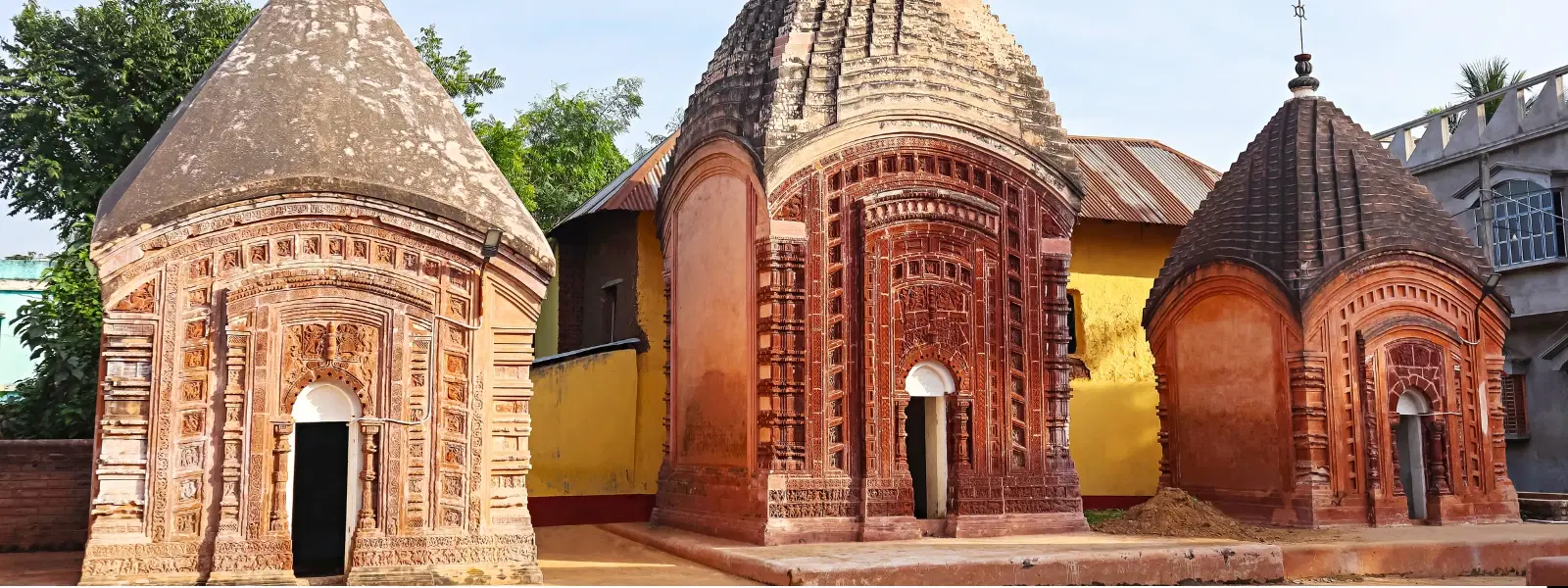
Flights
•04 min read

The Dakshineswar Kali Temple in Kolkata is a mesmerizing fusion of spirituality and architecture that has drawn devotees and travelers alike for generations. As one of India’s most famous religious sites, this historic temple not only serves as a haven for spiritual seekers but also a marvel of architectural beauty. In this guide, you will discover its rich history, unique architectural style, daily rituals, and practical details for planning your visit to this iconic landmark.
Founded in 1855 by the philanthropic Rani Rashmoni, the Dakshineswar Kali Temple was dedicated to Goddess Kali. The temple's foundation marks an era of spiritual revival along the sacred Ganges River. It quickly became a vibrant center for pilgrimage, not only due to its religious significance but also because of its deep connections with renowned spiritual figures like Ramakrishna Paramahamsa and Sarada Devi.
This temple holds a cherished place in Hindu spirituality by venerating Goddess Kali in her fearsome yet protective form, Bhavatarini. It played a pivotal role in the propagation of Hindu philosophy and the spiritual awakening of many through the teachings of Ramakrishna Paramahamsa. Visitors today are drawn to its legacy of devotion and centuries-old traditions, making it a revered symbol of faith and enlightenment.
The temple is renowned for its distinctive Navaratna, or nine-spired design, a signature of Bengali temple architecture. The intricate carvings on the spires reflect the artistry of a bygone era and serve as a visual narrative of devotion. The central shrine, surrounded by striking courtyards, creates an ambiance that is both visually captivating and spiritually soothing.
A visit to the temple complex offers much more than just the main structure. Encompassing the Radha-Krishna temple, dedicated Shiva temples, and a sacred bathing ghat along the Ganges, the entire complex is an artistic ensemble that mirrors the blend of spirituality and craftsmanship. Every structure contributes to the serene atmosphere, inviting visitors to experience the divine essence of this cultural landmark.
Serving as a beacon for seekers of inner truth, Dakshineswar has long been associated with spiritual enlightenment. The temple remains a hub for devotees who are eager to absorb the teachings of Vedanta philosophy—a legacy propagated by Ramakrishna Paramahamsa. Its continued relevance as a center of spiritual learning and devotion makes it a cornerstone among Kolkata religious sites.

Daily rituals are a central part of the temple’s life. Devotees can experience the serene morning and the soulful evening aarti, where the flames of the diyas and the fragrance of incense blend with the chants of sacred hymns. The offering of bhog is an integral ritual, inviting visitors to engage actively in the worship practices while absorbing the temple’s tranquil energy.
The temple welcomes visitors from early morning, around 6:00 AM, until late evening, around 8:00 PM. During festive periods, special timings might be observed to accommodate the increased flow of devotees. While entry is free, there may be nominal charges for certain ritual offerings such as bhog coupons.
Located in the northern suburbs of Kolkata, the Dakshineswar Kali Temple is easily reachable from the city center. Public transport options are plentiful; local trains, buses, and taxis all provide convenient access. The nearest railway station, aptly named Dakshineswar, stands as a testament to the temple’s historical significance and ease of accessibility.
For an experience that resonates with peace and devotion, consider visiting during the early morning or early evening hours when the temple is less crowded. Remember to wear modest clothing as a sign of respect and observe the temple’s age-old customs. Your visit is not just a tour but an immersive experience into a rich tapestry of cultural and spiritual traditions.
If your heart seeks more spiritual explorations, consider temple-hopping to nearby destinations such as the renowned Kalighat Kali Temple. Each temple in Kolkata adds its own unique verse to the lyrical history of the city’s religious heritage.
A boat ride along the Ganges offers a complementary and soul-stirring perspective to your visit at Dakshineswar. Enjoy the lush landscapes and the soothing flow of the river, a scene that has been celebrated in Hindu culture for its purity and spiritual symbolism.

Did you know? Dakshineswar Kali Temple was the spiritual home of Ramakrishna Paramahamsa, who meditated here for years and became one of India's most revered saints. His teachings continue to inspire millions worldwide.
The temple is famous for its association with Goddess Kali, its unique architecture, and its spiritual connection to Ramakrishna Paramahamsa, a revered saint in Hinduism.
Entry to the temple is free, but there may be charges for specific offerings or rituals, such as bhog coupons.
While Dakshineswar Kali Temple is one of the most famous, Kalighat Kali Temple is considered the main Kali temple in Kolkata due to its ancient origins and significance.
The temple is generally open from early morning (around 6:00 AM) to late evening (around 8:00 PM), with specific timings for rituals and aarti.
The temple is located in the northern suburbs of Kolkata and can be reached via local trains, buses, or taxis. The nearest railway station is Dakshineswar.
Dakshineswar Kali Temple in Kolkata is far more than a place of worship—it is a living emblem of the region's rich cultural and spiritual heritage. From its storied past and captivating architecture to its vibrant daily rituals, every aspect of the temple offers insights into an enduring legacy of devotion and enlightenment. Warm your soul with history, immerse yourself in traditional artistry, and let the serene atmosphere of the temple inspire your spirit.